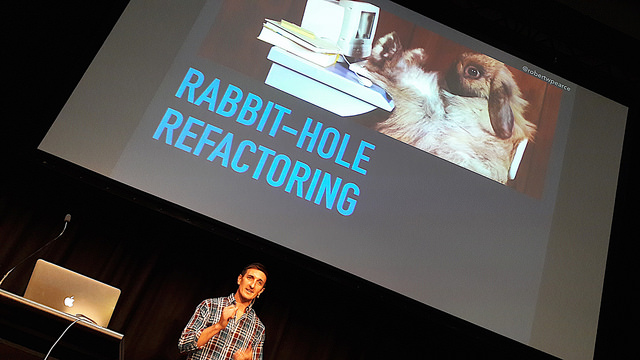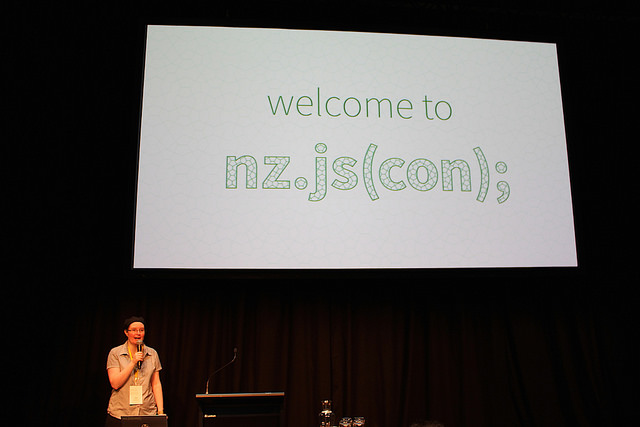I recently had the pleasure of directing the first national JavaScript conference for New Zealand, which took place in Wellington earlier this year. The conference, nz.js(con); lasted for two days, with a couple of tracks of amazing talks from both local and international speakers.
I think it went pretty well – we got good feedback after the event and we sold out with over 300 attendees – and I’d like to share with you some of the things I learned the hard way while preparing for the conference. I was lucky in that I’d had the opportunity to co-direct an established NZ tech conference a few years prior, Kiwi PyCon, which meant I knew roughly what things needed to be accomplished and by when.
But if you haven’t had that same experience and you’re still keen to give the whole conference organising thing a go, here’s my outline of the things you’ll need to work though:
1. Niche
So you have an idea for a conference? Great! What will make your event stand out from the herd? Have a good look around at other conferences that are happening in the same space or for the same audience, and think about how you can be differentiate what you’re offering.
2. Format
Once you’ve found your niche, decide on your format. There are heaps of options to consider –
- Will you recruit speakers directly or issue an open call for papers?
- Will your speakers be paid? How much? What about their’ travel costs?
- What sort of price ballpark will you be aiming for for you ticket prices?
- Will your conference have multiple tracks or just a single track?
- How long will your conference be – a single day or several days?
- Will your conference be scheduled during the week or on the weekend?
These decisions will help your conference take shape, and they define your potential audience, so think carefully.
3. Logistics
Now for the fun bit (OK not that fun, sorry, but this is where the majority of your effort should go!). Don’t skip on the administration, it’s key to things running smoothly (I sent over 500 emails over the course of a year working on this). You’ll need to consider stuff like:
- Finances – budget, bank accounts, sponsorship, GST (are you going to raise more than the magic 60k figure whereupon you need to be charging it?)
- Insurance – do you need it? (probably at least some liability insurance for the venue)
- Catering – do you want to feed your attendees? What about special dietary needs?
- Diversity programme – are you going to run one (you absolutely should be)? How will it be funded?
- Audiovisual – what equipment will you need and where will you get it?
- People power – who will staff the front desk? Security? Camera? Sound desk?
- Support – while it’s not crucial, having the backing and support of the company that you (the organiser) works for can be super helpful.
I was lucky that Catalyst gave me a little bit of time on top of my normal senior fronted dev duties to keep the admin for the conference ticking over during business hours when I needed to be talking to suppliers. This is the part that will take the most time and energy. Get together a group of reliable people to help you with logistics if you can. Communicate regularly, make lists and document everything – you’ll be glad you did later.
4. Marketing
Got your conference organised? Great! Make sure people know about your conference so they’ll show up. People in the tech community like to hang out online, so you can reach out to them via:
- Online user groups and mailing lists
You can also use in-person user groups and university student groups to get the word out about your event. Regardless of how it is marketed, your event will need a website with useful information on it (where, when, why, how). If you’re running a diversity programme, make sure you put effort into publicising that too. Also make sure you have a solid conference code of conduct so your your potential attendees know you are considering their comfort and safety.

5. Showtime!
The day has arrived! Excitement! Then… a problem. Stay calm. No conference ever runs precisely to plan without any hiccups. Panicking is unlikely to help. If you communicate well with your attendees about what’s happened and what you’re doing to fix it, they will usually be very understanding. Don’t forget to explain the code of conduct to your attendees and make sure they understand how to report violations (and have a plan for how you will address any reports).
6. Relax
It’s done! Take some time out. Catch up on sleep, see your family, etc.
7. Housekeeping
Pay any outstanding bills and tidy up any outstanding bits and pieces. Then it’s time to review the conference. Make sure you gather feedback from attendees so you know what worked and what didn’t.
8. Play again? Y/N
Consider the feedback you received versus how much work your conference was, and think about whether you want to run your conference again in the future.
More information
If I haven’t put you off yet and you’re interested to learn more, you can read my extensive nz.js(con); documentation here – it’s specific to nz.js(con); but there is plenty of general information you might find useful.
___
Photos used in this article are from the album nz.js(con); by Kristina Hoeppner and are used under a Creative Commons CC BY-SA 2.0 license.

